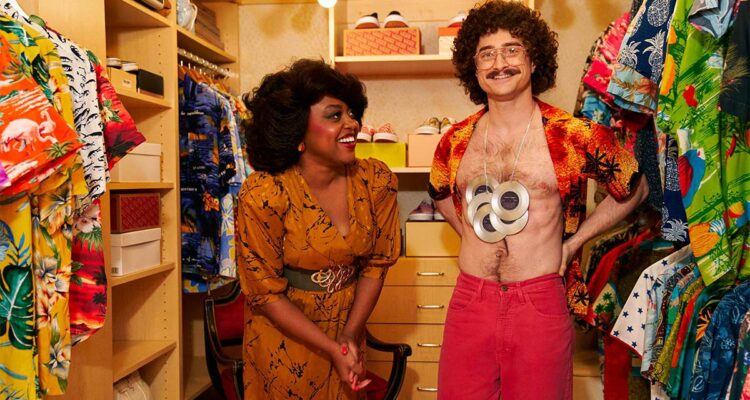The secret to “Weird Al” Yankovic’s estimable powers is that he’s flagrantly, proudly, irresistibly uncool. He plays the accordion, one of the few instruments that no musician in human history has ever gotten laid for mastering, and he uses it to perform polka-themed parodies redolent of cornball Borscht Belt acts far from any sector of comedy even adjacent to ‘edgy.’ His songs reflect this much in that they’re basically about nothing, riffs on relatable banalities like finishing your dinner, or absurdities like Amish hip-hop. He’s not only not a rock star but actively pursues the opposite lifestyle as a practicing Christian who refrains from drinking, getting high, or working blue. For a certain breed of eccentric consumer amenable to the brand of upbeat daffiness he peddles, these quirks coalesce into a charm on the merit of their deliberateness and earnestness.
READ MORE: TIFF 2022: 16 Must-See Films To See At The Toronto Film Festival
The comic conceit of “Weird: The Al Yankovic Story,” the liberty-taking anti-biopic from sitcom stalwart Eric Appel, imagines a world that allows this strain of uncoolness to reign as culturally dominant. Teenagers sneak out for “polka parties” that get broken up by the cops; silly ditties reworking the pop single du jour outsell The Beatles to go quintuple-platinum; a goofball following a screwloose muse can live like Jim Morrison. The gag has a lot of mileage, helped along by a spoof act of its own, sending up the overwrought, formulaic beats of the songwriter-genius picture. “Walk Hard: The Dewey Cox Story” proved how productive making fun of the genre can be, but in this case, there’s a core of winning sincerity to set Appel and cowriter Yankovic’s approach apart. In repositioning a singularly ridiculous niche talent and his “extremely specific” musical tradition at the top of the mainstream, the film creates a beautiful alternate reality in which every cult object receives the wider celebration it deserves.
READ MORE: Fall 2022 Preview: 60+ Must-See Films To Watch
The largely invented rise of Weird Al (portrayed by a shredded, lip-syncing Daniel Radcliffe, holding nothing back) begins in the usual fashion, with parents that don’t support him and an industry that doesn’t understand his passions. These clichés and the rest of the hoary tropes packaged with them are refreshed by exaggeration, pushed to extremes of ludicrousness in an off-kilter dimension that can accommodate anything with a straight face. Mary Yankovic (Julianne Nicholson) consoles her young son by telling him that “your dad and I agreed that it would be best if you stop being who you are and doing the things you love,” while his no-nonsense father (Toby Huss) takes out his rage by beating a chipper door-to-door accordion salesman (Thomas Lennon, one of a dozen-plus alt-comedians popping in for a cameo) for a full minute. The latter bit and the others like it don’t play on cinematic convention as much as they veer off in their own brilliant-stupid direction, a stroke of inspired idiocy more closely related to the under-appreciated movie projects of The Lonely Island than the Funny or Die sketch that begat this feature.
Two members of that esteemed troupe appear in a party scene modeled after the one from “Boogie Nights,” with Akiva Schaffer donning goth makeup as Alice Cooper while Jorma Taccone squeezes into the too-small suit of Pee-Wee Herman. Radio cut-up and Weird Al’s eventual mentor Doctor Demento brings his newly discovered protege to the pool bash so he can get to know a social circle that also includes falsetto-voiced ukulele virtuoso Tiny Tim (Demetri Martin), watermelon-smasher extraordinaire Gallagher (Paul F. Tompkins), drag legend Divine (Nina West), and growling disc jockey Wolfman Jack (Jack Black). The nod to Paul Thomas Anderson’s porn epic isn’t just for fun, but a subtle nod to the similar stratification of fame on the under-the-radar novelty-act circuit. These people lord over their obscure corners of pop culture, but as in the unpredictable real-world music biz that does let the occasional “White and Nerdy”-level crossover slip onto the charts, Weird Al gets the rare chance to break through and score one for the freaks.
With polished production values that clinch his aspiration to mimic the genuine article of awards-baiting pap, Appel charts Weird Al’s delirious ascent through a Yoko-ing courtesy of villainous girlfriend Madonna (Evan Rachel Wood) and a digression in Colombia to go all Rambo on Pablo Escobar (Arturo Castro). That tangent elongates a run time which would probably be best served by brevity to the two-hour mark, though the pivot into a preposterous life-and-death espionage thriller helps forestall any wearing-out of welcomes. It’s a savvy turn, going out by aping an even broader class of blockbuster; earlier, Weird Al rejects an offer to take over as James Bond, uninterested in anything that would keep him from his purpose on this earth.
By bending reality so that everyone else feels spoken to by the same dorky curios that creatively energized Weird Al, the free-interpretive script lets its embellished hero have it both ways, equally successful and true to himself. The paradigm that positions such magnificent weirdoes — there’s no other word for it — on top of the circa-‘80s zeitgeist also grants the wish of every kid obsessed with something their friends didn’t get: what if you got to pick what was cool? This whoopie cushion of a film raises the concept of the lowest common denominator up to the highest highs of esoteric tastes and in doing so, gets closer to the essence of artistry than all of its self-important, straight-faced forebears. [B+]
Follow along with all our coverage of the 2022 Toronto International Film Festival.

